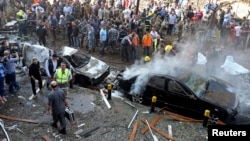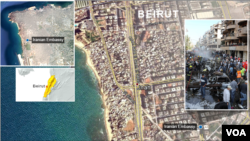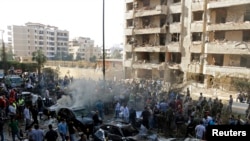CAIRO —
Officials in Lebanon say at least 23 people were killed and more than 140 wounded in two bomb blasts Tuesday near the Iranian embassy in Beirut. An Iranian diplomat was among those killed.
It was a scene of devastation in south Beirut when two explosions, one after the other, left victims lying shattered on the ground, and the area in and around the Iranian embassy blackened by the blasts.
Lebanese authorities say a suicide bomber and a car bomb were the source of the destruction in the Bir Hassan neighborhood. Lebanon's Health Minister Ali Hassan Khalil called it a terrorist attack.
An al-Qaida-linked group called the Abdullah Azzam Brigades claimed responsibility for the bombings, and threatened further attacks unless Iran pulled its forces out of Syria.
Tehran is the major regional backer of Syrian President Bashar al-Assad, a member of the Alawaite sect derived from Shi'ite Islam. Iran also supports Lebanon's political and militant Shi'ite group Hezbollah.
The area of the bombings is a Hezbollah stronghold, and was hit by several attacks in July and Auust.
Political science professor Karim Makdisi of the American University in Beirut believes Tuesday's explosions and those of recent months are part of the same problem. “There is no way that these car bombs situations are going to be resolved unless or until there is a settlement in Syria,” said Makdisi.
Hezbollah has sent fighters to battle alongside Syrian government troops, raising tensions with Lebanese Sunnis, many of whom support Syria's largely Sunni-led opposition.
Syria's civil war began as a broad-based civilian protest of the Assad government, but has deteriorated into a largely sectarian conflict, with Sunni jihadist fighters coming from abroad to join, and sometimes lead, rebel groups.
Spillover from the conflict has raised fears Lebanon could revert to the sectarian civil war that devastated the country in the 1970's and 80's.
Professor Makdisi is hopeful, however, that will not happen. “Everything is a possibility, you know, but Lebanon has been on the brink for the past two, three years because of the Syria war and it has not collapsed yet.”
He argued that most of Lebanon's leaders feel there is no point in engaging in sectarian violence, adding he doesn't think anything like that will happen “for the time being.”
It was a scene of devastation in south Beirut when two explosions, one after the other, left victims lying shattered on the ground, and the area in and around the Iranian embassy blackened by the blasts.
Lebanese authorities say a suicide bomber and a car bomb were the source of the destruction in the Bir Hassan neighborhood. Lebanon's Health Minister Ali Hassan Khalil called it a terrorist attack.
An al-Qaida-linked group called the Abdullah Azzam Brigades claimed responsibility for the bombings, and threatened further attacks unless Iran pulled its forces out of Syria.
Tehran is the major regional backer of Syrian President Bashar al-Assad, a member of the Alawaite sect derived from Shi'ite Islam. Iran also supports Lebanon's political and militant Shi'ite group Hezbollah.
The area of the bombings is a Hezbollah stronghold, and was hit by several attacks in July and Auust.
Political science professor Karim Makdisi of the American University in Beirut believes Tuesday's explosions and those of recent months are part of the same problem. “There is no way that these car bombs situations are going to be resolved unless or until there is a settlement in Syria,” said Makdisi.
Hezbollah has sent fighters to battle alongside Syrian government troops, raising tensions with Lebanese Sunnis, many of whom support Syria's largely Sunni-led opposition.
Syria's civil war began as a broad-based civilian protest of the Assad government, but has deteriorated into a largely sectarian conflict, with Sunni jihadist fighters coming from abroad to join, and sometimes lead, rebel groups.
Spillover from the conflict has raised fears Lebanon could revert to the sectarian civil war that devastated the country in the 1970's and 80's.
Professor Makdisi is hopeful, however, that will not happen. “Everything is a possibility, you know, but Lebanon has been on the brink for the past two, three years because of the Syria war and it has not collapsed yet.”
He argued that most of Lebanon's leaders feel there is no point in engaging in sectarian violence, adding he doesn't think anything like that will happen “for the time being.”










